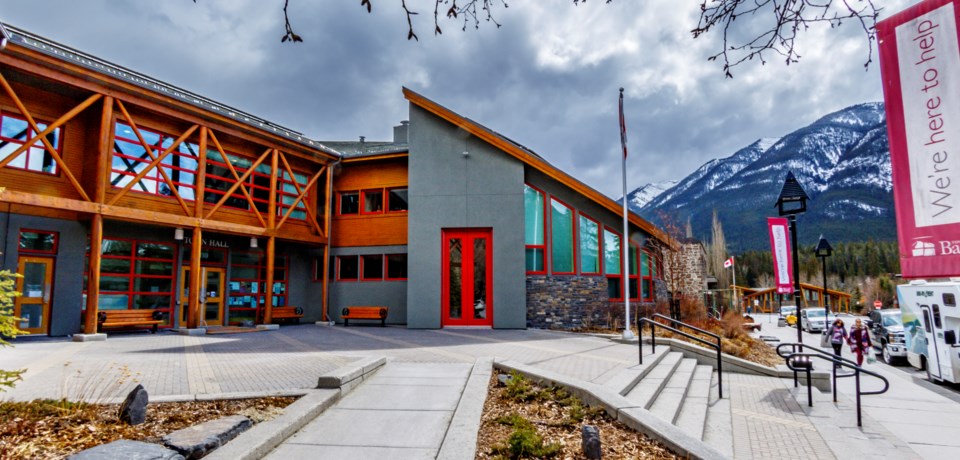BANFF – The Town of Banff is investigating the creation of an independent ethics commissioner or committee to oversee public complaints of misconduct against councillors.
Following a call from a Banff resident for an ethics committee, Banff council has asked administration to bring back options for consideration as part of a review of the council code of conduct bylaw in the first three months of 2022.
“I think it’s timely and I think it’s appropriate for our council to do it,” said Councillor Ted Christensen during council’s Sept. 13 meeting.
At least two elected officials in the past four-year term have been investigated under council’s code of conduct bylaw, including Coun. Peter Poole who was recently vindicated over conflict of interest allegations on the train station lands redevelopment.
Former mayor, Karen Sorensen, faced allegations related to her husband Carsten Sorensen and his company having been one of the brokers providing a benefits package to the Town of Banff since 2005.
However, the RCMP and an investigation by an independent investigator contracted by the Town of Banff cleared the former mayor, who is now a Canadian senator, of any wrongdoing or conflict of interest. The allegations were made by residents Jamie MacVicar and Barry Kelly.
Kelly, a 20-year resident of Banff and a retired high-ranking RCMP officer, was before town council last week asking for the creation of an independent ethics committee, noting it is the adherence to ethical standards that forms the foundation for public trust.
“We know human nature has its flaws so we don’t rely on perfect conduct,” he said. “What we do rely on are systems in place that assure missteps are corrected and fair process ensues, not just for some, but for all citizens.”
Under the best of circumstances, Kelly said no organization can successfully monitor itself when it comes to misconduct.
“A protectiveness sets in, and the acts of a few, left unchecked, can impact the whole,” he said.
“It is why healthy organizations and governments welcome the checks and balances that an independent body can bring. But even this depends on all citizens feeling free to voice a complaint.”
Under Kelly’s proposal, the composition of an ethics committee would include five qualified citizens and one rotating member of council, with diversity paramount in age, gender, and ethnicity when possible.
Kelly said the Town would advertise the available membership, but it would be up to the committee to select its members.
“Only then could it truly be perceived as independent,” he said, adding the committee would be versed in the rules governing conduct, which includes Banff’s code of conduct bylaw and other applicable resources.
Kelly said the committee, which would be advisory in nature, would report its findings to council and advise the complainant of the outcome.
“I am willing to volunteer as its founding chair to work with council and administration to create a body that builds public trust and strengthens community relations,” he said.
Councillor Chip Olver said an ethics commissioner seems to be a more common municipal practice in Alberta than a public ethics committee as suggested by Kelly.
However, she pointed to Canmore’s method of handing any complaints over immediately to a third party investigator.
“Canmore is unique in their method, but I am quite attracted to it,” Coun. Olver said.
“It goes right to an investigator and then there’s no chance for any feelings that council is weighted or biased in any way because they’re not involved.”
Olver also suggested the idea of exploring sub-contracting the ethics or integrity commissioners working in the cities of Calgary or Edmonton who already have extensive training on this topic.
“I don’t think it’s something that would come up very frequently, but to have the resources and skills of trained professionals who are working in this field already, I think would be advantageous,” she said.
Under Banff’s current process, any resident can make a complaint against councillors under the code of conduct bylaw through the corporate services director – with either council or a third party reviewing the complaints.
Town Manager Kelly Gibson said council has done both and believes there is an adequate system in place to deal with complaints.
“An ethics committee isn’t something I’m aware of or something I’ve seen as far as a group of citizens, definitely not ones that the members aren’t selected by council,” he said.
“I think council would want to retain some kind of knowledge and control of who sits on an ethics committee.”
Council has also asked administration to look into possible inclusion of coverage under the provincial ombudsman.
Since 2018, the provincial ombudsman has authority to investigate municipalities on matters of administration, not policy decisions made by elected officials; however it doesn’t legally apply to Banff because of the incorporation agreement with the federal government.
Gibson said the municipality is having discussions with the federal justice department to see if there are some investigations that could fall under the jurisdiction of the ombudsman.
“We are exploring that, but they wouldn't have powers to pass anything onto the federal minister,” he said, noting the provincial ombudsman has been primarily dealing with complaints of planning and land development in Alberta, which in Banff's case, is a federal authority.




